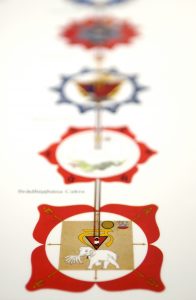 As the hot summer days of August begin to transition to the early fall days of September, the Yasodhara Yoga Ladner teachers, Kali (Irene Scarth), Bhakti (Elizabeth Quinn) and Moira Izatt, invite us to reflect on our five senses and our mind – the sixth sense.
As the hot summer days of August begin to transition to the early fall days of September, the Yasodhara Yoga Ladner teachers, Kali (Irene Scarth), Bhakti (Elizabeth Quinn) and Moira Izatt, invite us to reflect on our five senses and our mind – the sixth sense.
Each of the first five cakras in the Kundalini system is associated with one of the five senses. The mind is related to the sixth cakra. In Eastern philosophy, the mind is considered the sixth sense.
YOUR SENSES AND YOUR MIND
Go for a walk in nature. Repeat the Divine Mother Prayer as you walk. How do your five senses and your mind interact with your environment?
Find a quiet place to write about what you have observed.
What do you know about your senses and your mind? What have you learned? Which sense or senses stand out today? What is your mind doing?
How have you experienced your less dominant senses? Do any of your senses overlap? How does that manifest in your daily life?
MULADHARA, 1ST CAKRA: THE SENSE OF SMELL
The sattvic state of the sense of smell is achieved at a further stage of development when all senses are refined and when the mind has been given proper spiritual food. (Kundalini Yoga for the West, Swami Radha, p 66)
Stand in Mountain. Lift your toes and feel the four corners of your feet on the ground. Lower your toes, one toe at a time.
Standing in Mountain, ask yourself: How has my sense of smell become refined? Give an example.
Sit in a meditative posture and follow the rhythm of your breath. Ask yourself: How does my sense of smell affect my daily life? Does my sense of smell affect how I look after my home or my larger environment? Does it affect how I respond to people?
SVADHISTHANA, THE 2ND CAKRA: THE SENSE OF TASTE
The intelligence on this level is symbolized by Vishnu, the Preserver, the second aspect of the Hindu Trinity. The aspect of preservation is extremely important to human life. (Kundalini Yoga for the West, Swami Radha, p 96)
Chant a mantra and ask yourself: ‘What do I want to preserve? What do I want to let go of?’
MANIPURA, THE 3RD CAKRA: THE SENSE OF SIGHT
Just as complicated mathematical formulas are unintelligible to the untrained mind, so are higher aspects of the meanings of words like mantra. (Kundalini Yoga for the West, Swami Radha, p 135)
Choose a practice and ask yourself, ‘What does mantra mean?’
Make a list of words or phrases from your spiritual vocabulary. Choose a practice and reflect on the meanings of these words. What changes do you perceive in your understanding? Do any questions or resolutions arise? Are there any that you would like to define, redefine or expand? Why?
ANAHATA, THE 4TH CAKRA: THE SENSE OF TOUCH
‘Touching’ and ‘feeling’ are interchanged in everyday language. Should they be? (Kundalini Yoga for the West, Swami Radha, p 174)
Observe (or remember) how you use the terms touch, touching, and feeling(s) in your speech. Can you differentiate between their subtle meanings and clarify your thoughts and speech about this important sense? Write about your observations, including examples from your daily life.
How do you relate touch to feelings and to emotions? (Kundalini Yoga for the West, Swami Radha, p 176)
Watch your speech to investigate or recall situations where ‘feelings’ played a role and situations in which ‘emotions’ were present. Write reflections.
VISUDDHA, THE 5TH CAKRA: THE SENSE OF HEARING
Much energy is wasted listening to (our own interfering) thoughts, which are based on mental speculation, self-defense and self-justification, so that it becomes impossible to truly hear what another person says. (Kundalini Yoga for the West, Swami Radha, p 232)
Think of an example when your own thoughts interfered with listening and another example when you did listen to another person. What was the difference? What practices can help you listen?
AJNA, THE SIXTH CAKRA: MIND THE INTERPRETER
Life is perceived through the senses, and mind acts as the interpreter. (Kundalini Yoga for the West, Swami Radha, p 279)
Consider the concept of ‘pure mind’. What would that mean to you, and how can you expand your understanding of the true nature of mind to be ‘pure mind’. Record your reflections.
The mind is affected by the breath. Watch your mind. Breathe to an even count for 5 or 10 minutes. Note what happens with the mind and emotions. (The Yoga of Healing, Swami Radha, p 80)
We still the body in order to still the restless, ever-jumping mind. Record what you remember of your mind watch for the same period of time that you watched the mind, 5 or 10 minutes. Review your notes. How was your mind affected? Your emotions?


Comments are closed.